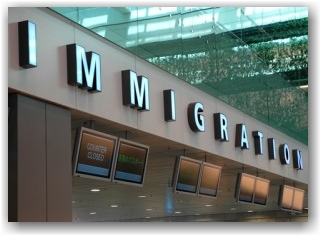Archive for the ‘Comprehensive Immigration Reform’ Category
Wednesday, February 20th, 2013
 This new process allows certain immediate relatives of US citizens who are physically present in the USA and are seeking permanent residence, to apply for and receive provisional unlawful presence waivers BEFORE departing the US for consular processing of their immigrant visa applications abroad.
This new process allows certain immediate relatives of US citizens who are physically present in the USA and are seeking permanent residence, to apply for and receive provisional unlawful presence waivers BEFORE departing the US for consular processing of their immigrant visa applications abroad.
The benefit of this is that it will reduce the time that U.S. citizens are separated from their immediate relatives while those family members go through the consular process overseas to obtain an immigrant visa. Immediate relatives of U.S. citizens who would need a waiver of unlawful presence in order to obtain an immigrant visa could file a new Form I-601A, Application for Provisional Unlawful Presence Waiver, before leaving the United States to obtain an immigrant visa at a U.S. Embassy or Consulate abroad. All individuals eligible for this streamlined process are still required to depart the United States and must meet all legal requirements for issuance of an immigrant visa and admission to the United States.
An individual may seek a provisional unlawful presence waiver if he or she:
- Is physically present in the United States;
- Is at least 17 years of age;
- Is the beneficiary of an approved immigrant visa petition (I-130) classifying him or her as an immediate relative of a U.S. citizen;
- Is actively pursuing the immigrant visa process and has already paid the Department of State immigrant visa processing fee;
- Is not subject to any other grounds of inadmissibility other than unlawful presence; and
- Can demonstrate that the refusal of admission would result in extreme hardship to a U.S. citizen spouse or parent.
An immediate relative would not be eligible for the proposed process if he or she:
- Has an application already pending with USCIS for adjustment of status to lawful permanent resident;
- Is subject to a final order of removal or reinstatement of a prior removal order;
- May be found inadmissible at the time of the consular interview for reasons other than unlawful presence; or
- Has already been scheduled for an immigrant visa interview at a U.S. Embassy or Consulate abroad.
Allowing immediate relatives of U.S. citizens to receive provisional waivers in the United States before departure for their immigrant visa interview at a U.S. Embassy or Consulate means that:
- Immigrant visa processing times will improve because of greater capacity in the United States and fewer case transfers between USCIS and the Department of State;
- Immigrant visas will be issued without unnecessary delay (if the individual is otherwise eligible); and
- The period of separation and hardship many U.S. citizens would face due to prolonged separation from their family members will be minimized.
For additional information,we link to the I-601A Questions and Answers document.
Should you wish to become a client of our office, please contact us.
Tags: Consular Processing, DOS, Green-Cards, I-601A Provisional Waiver Application, Immediate Relatives of US Citizens, Immigrant Visas (I-140 Petitions), Immigration News, Immigration Reform, PERMANENT RESIDENCY, Provisional Unlawful Presence Waiver, Unlawful Presence Waivers, US Consulates, US Work Authorization
Posted in Comprehensive Immigration Reform, Department of State, Immigrant Visas (I-140 Petitions), Immigration Legislation, Immigration News, US Consulates | Comments Off on Provisional Unlawful Presence Waiver Process goes ‘live’ March 4, 2013
Monday, January 28th, 2013

A group of 8 bipartisan senators have reached a deal on the outline of a comprehensive immigration overhaul, a development that is long overdue and will assist in framing the forthcoming immigration debate in Congress. Senator Schumer has stated that it is their plan that this can be turned into legislation by March and put into law by mid-late summer 2013.
According to a five-page document released today, the proposal provides a broad-based approach, agreed to in principle by eight senators, that seeks to overhaul the immigration system and create a pathway to citizenship for the nation’s roughly 11 million illegal immigrants.
Although all that we have focused on for years now is nothing else but border and enforcement issues and employment verification, the proposal takes enforcement to the next level by perfecting an entry/exit tracking system, and greater usage of E-Verify or a new and improved E-Verify system that is referred to as “fast and reliable.”
Legislators will create a commission comprised of border governors, attorneys general and community leaders living along the southwest border to monitor the progress of securing the border and to make a recommendation regarding when the bill’s security measures outlined in the legislation are completed.
While security measures are put in place, those who came and remained in the USA without permission, will be required to register with the government. This will include background checks, paying a fine and back taxes to earn probationary legal status to continue to live and work legally in the USA.
Once enforcement measures have been completed, those in probationary legal status will be required to go to the back of the line to wait their turn, pass an additional background check, pay taxes, learn English and civics and demonstrate a history of work in the US and current employment, among other requirements, to earn the opportunity to apply for lawful permanent residency (green-card) status. Those who successfully complete these requirements can eventually earn a green-card (legal permanent residence).
Special provisions will be accorded to the Dreamers (minor children who did not knowingly choose to violate any immigration laws) who will have different requirements that will include a pathway to citizenship.. Individuals who have been working illegally in the agricultural industry performing difficult work for low wages to ensure the safety of the food supply of the US will also be provided special requirements and will have a pathway to citizenship.
Those who graduate from an American University with a Ph.D or Master’s Degree in science, technology, engineering or math (STEM), will be awarded permanent residency (green-card status) to keep the best and brightest talent in the USA.
There are also provisions for a guest worker program referred to as “lower-skilled workers” in the proposal that will meet the needs of employers, the agricultural industry, including dairy, to find agricultural workers and lower skilled immigrants when the economy is creating jobs and fewer when the economy is not creating jobs. If this is the H-2B program, we sincerely hope that it gets an overhaul – it’s entirely too complicated, takes too long and completely discourages employers by overburdening them with excessive details.
Resources
Please see the senator’s attached Transcript. It’s certainly a an introduction to a long-awaited immigration conversation that is achievable – but difficult. A link to a transcript from the President’s speech in NV; and the President’s Immigration Fact Sheet.
What are the differences between the Senate and Obama Plan?
Tags: Agricultural Workers, Border Patrol, border security, Comprehensive Immigration Reform, E-Verify, Employment Eligibility Verification, Entry/Exit System, Guest Worker Program, IMMIGRATION ENFORCEMENT, Immigration News, Immigration Reform, Legal Workforce, Obama NV speech, STEM Students, Unskilled Workers, WORKPLACE ENFORCEMENT
Posted in Agriculture, Comprehensive Immigration Reform, Congress, Immigration Legislation, Immigration News | Comments Off on Senators Pitch Immigration Compromise
Sunday, December 30th, 2012

As 2012 winds down, with year-end planning sessions and budget meetings for 2013, how would you rate your company’s employment eligibility compliance program, as it stands right now? We are not in the bubble bursting business, but we’ve yet to see a compliance program that doesn’t need some upgrading and refinement – no one’s is perfect.
According to new data from ICE, since 2007, employer I-9 audits have increased from 250 to more than 3,000 in 2012. From fiscal years 2009 to 2012, the total amount of fines grew to nearly $13 million from $1 million. Statistics released by ICE in July 2012 stated that overall, $87.9 Million in fines have been imposed on employers for violations. The number of company managers arrested has increased to 238. Widespread employer audits will continue to increase this year. Plain and simple, failing to comply with IRCA’s I-9 rules will continue at a rapid rate, resulting in significant fines, loss of access to government contracts, an onslaught of negative publicity, business closure, criminal penalties and imprisonment.
With all the advice, blogs and articles written about the most complicated 1-page form on the planet, there are some basics – a simple formula that, if implemented, followed and maintained, will greatly enhance your level of I-9 compliance and reflect your company’s genuine desire to get its compliance house in order. This is what we recommend:
- Invest in a comprehensive I-9 audit by a knowledgeable attorney or professional who actually practices in this area of the law. Don’t engage in a self-audit without participating in a thorough training program first. This will cause more harm than good; it’s like the blind leading the blind.
- Following the audit and the review of your report of findings, get trained before the correction process begins. Who should be trained? All those who have hands-on exposure to the I-9 process at all of your organization’s locations…and all those who supervise the process and staff. Make training and reading the M-274 Employer Manual absolute requirements for those assigned to I-9 processing and management.
- Establish a written Compliance Policy. This does not need to be a huge undertaking, but should reflect your company policy concerning the steps you’ve taken to assure a compliant workforce and a culture of compliance at your organization. It will be your road map and reflects that you take compliance seriously. ICE will request this document, amongst many others, should they ever come knocking on your door.
- Appoint a Compliance Guru – one who has a senior level of knowledge, who will monitor your internal compliance program, review your I-9 forms every few months for accuracy and completeness, provide updates and arrange for refresher training on a yearly basis.
- Consult with a trusted professional in the field when questions or challenges arise – don’t guess.
Remember, the key to defending any employment related investigation is to evidence that there is and has been a consistent pattern of responsible, good faith effort on the part of the employer in establishing a compliant workforce. Stay informed, subscribe to our Blog, newsletter, and join in the conversation on our LinkedIn Group I-9/E-Verify: Smart Solutions for Employers. Check out our compliance services and solutions here, and make a concerted effort this year to increase your level of compliance by following the above formula.
Tags: Compliance Policy, E-Verify, Employment Eligibility Verification, I-9 AUDIT, I-9 Form, I-9 Immigration Compliance, I-9 Training, I-9/E-Verify News, ICE, ICE Audit, Immigration compliance, Immigration News, Legal Workforce, Mandatory E-Verify, USCIS
Posted in Comprehensive Immigration Reform, Employer Compliance, I-9/E-Verify News, ICE, Immigration Legislation, Immigration News, OSC, USCIS | Comments Off on I-9/E-Verify: 2013 Compliance Considerations for Employers
Thursday, November 29th, 2012
 Much of the immigration challenges around case approval for entrepreneur start ups with USCIS has to do with the cases being reviewed by untrained officers, a lack of overall guidance for attorneys and practitioners concerning this casework, and a fundamental lack of “real world”, hands-on business knowledge on the part of USCIS. The agency has definitely released a nice looking mini-website marketing piece on the subject. We remain hopeful that the implementation of the below-listed changes will be the start of a new mindset for USCIS adjudication of entrepreneur start-up casework. In reviewing the information, we note that the Entrepreneur in Residence (EIR) team states that they have:
Much of the immigration challenges around case approval for entrepreneur start ups with USCIS has to do with the cases being reviewed by untrained officers, a lack of overall guidance for attorneys and practitioners concerning this casework, and a fundamental lack of “real world”, hands-on business knowledge on the part of USCIS. The agency has definitely released a nice looking mini-website marketing piece on the subject. We remain hopeful that the implementation of the below-listed changes will be the start of a new mindset for USCIS adjudication of entrepreneur start-up casework. In reviewing the information, we note that the Entrepreneur in Residence (EIR) team states that they have:
– Developed and deployed a training workshop for USCIS employment-based immigration officers that focuses on start up businesses and the environment for early-stage innovations;
– Trained a team of specialized immigration officers to handle entrepreneur and start up cases;
– Modified Request for Evidence templates for certain nonimmigrant visa categories to incorporate new types of relevant evidence into the adjudicative process; and
– Developed a plan for quarterly engagements with the entrepreneurial community to ensure that USCIS stays current with industry practices.
To sustain the momentum and build on the team’s accomplishments, USCIS indicated that they have extended the EIR project through April 2013. The project should be extended indefinitely if we are seriously courting foreign entrepreneurs to help jump-start the US economy. Among other things, the team states that it will expand its focus to immigrant visa pathways that may enable foreign entrepreneurs to start a business in the United States within current immigration law.
We are hopeful, in light of the economic challenges ahead of us in the USA at this time, that Congress will have a light bulb moment and pass legislation for a Start-up Visa and find a balanced and fair approach to increasing the visa alotment for STEM occupations without the punitive tradeoff approach of penalizing other visa classifications in return. For more information on the EIR program, we link here.
Tags: Congress, E-2 Visa, EB-5 Individual Visa, EB=5 Regional Center, Entrepreneurs in Residence, Foreign Entrepreneurs, Foreign Investors, H-1B Visa, Immigration Legislation, Immigration Reform, Job Creators, Start-up Visa, USCIS
Posted in Comprehensive Immigration Reform, Congress, Global Immigration, H-1B Visas, Immigration Legislation, Immigration News, L-1 Visa, USCIS | Comments Off on USCIS Develops Tools to Help Foreign Entrepreneurs Create and Grow Businesses in the USA
Tuesday, September 11th, 2012
By: Timothy Sutton, Communications Editor
 After two years of being deadlocked in the court system, the injunction preventing Arizona’s police force from enforcing the racially controversial “papers please,” program was lifted Wednesday by U.S. District Court Judge Susan Bolton. The decision is the latest legal move in Valle del Sol v. Whiting, a class action legal challenge to SB 1070 that was filed in May 2010. Plaintiffs include an Arizona-born citizen of Spanish and Chinese descent who was racially profiled. “While today’s ruling puts civil rights at risk, it does nothing to undermine our resolve to continue fighting until SB 1070 is struck down in its entirety,” said Chris Newman, legal director of the National Day Laborer Organizing Network. The Supreme Court upheld SB 1070 2(b), also known as the “papers please,” provision, earlier this summer. However, Justice Kennedy suggested there would be clear constitutional problems if the law were used to target racial or ethnic minorities, or to detain people for an unreasonable period of time while checking their immigration status. Opponents assert this unwanted outcome of targeting minorities is certain to transpire.
After two years of being deadlocked in the court system, the injunction preventing Arizona’s police force from enforcing the racially controversial “papers please,” program was lifted Wednesday by U.S. District Court Judge Susan Bolton. The decision is the latest legal move in Valle del Sol v. Whiting, a class action legal challenge to SB 1070 that was filed in May 2010. Plaintiffs include an Arizona-born citizen of Spanish and Chinese descent who was racially profiled. “While today’s ruling puts civil rights at risk, it does nothing to undermine our resolve to continue fighting until SB 1070 is struck down in its entirety,” said Chris Newman, legal director of the National Day Laborer Organizing Network. The Supreme Court upheld SB 1070 2(b), also known as the “papers please,” provision, earlier this summer. However, Justice Kennedy suggested there would be clear constitutional problems if the law were used to target racial or ethnic minorities, or to detain people for an unreasonable period of time while checking their immigration status. Opponents assert this unwanted outcome of targeting minorities is certain to transpire.
However, Governor Jan Brewer insists that the “papers please,” law does not allow Arizona law enforcement to conduct pretext stops because it requires reasonable suspicion. In a public statement she claimed Wednesday’s District Court ruling is “one big step closer to implementing the core provision of SB 1070.” That provision? Ridding Arizona of illegal immigrants.
Arizona’s highly controversial Maricopa County Sheriff Joe Arpaio was also been quoted on the Glenn Beck Show, clarifying his interpretation of reasonable suspicion, “If they have their speech, what they look like, if they look like they come from another country, we can take care of that situation.” As Brewer and Arpaio ramp up for the certain increase in detainment leading to deportation both Cecilia Wong of the ACLU and Victor Viramontes of MALDEF have committed to continue the fight against SB 1070.
It won’t be long before SB 1070 2(b) is back in the courthouse being challenged for racial profiling and discrimination based upon national origin. We will keep you updated on those and other immigration related breaking news as it develops. For more information, contact one of our immigration professionals at info@immigrationcompliancegroup.com or call 562 612.3996.
Tags: ACLU, Arizona Show me your Papers, Comprehensive Immigration Reform, Governor Jan Brewer, illegal immigrants, Immigration News, Immigration Reform, MALDEF, Papers Please, Racial Profiling, SB 1070, SHERIFF JOE ARPAIO, Undocumented Workers
Posted in Comprehensive Immigration Reform, Congress, DACA | DAPA, Immigration Legislation, Immigration News | Comments Off on Politics As Usual: Show Me Your Papers Survives AZ Court
Monday, September 10th, 2012
This employer really crossed the line in continuing to employ unauthorized workers AFTER an ICE audit of their I-9 records commenced, and failed to produce I-9 records for them on 3 previous occasions while transferring them to other jobsite locations.
Here’s the story…. The charges against the owner and Production Manager, Yoel A. Wazana, Wazana Brothers International, Inc., based in Van Nuys, CA, doing business under the name Micro Solutions Enterprises (MSE), are the result of an investigation into MSE’s hiring practices that was initiated by HSI in 2007. According to court documents, shortly after MSE received notification in April 2007 that HSI planned to audit the company’s payroll and hiring records, Wazana directed that about 80 of MSE’s most experienced employees – at least 53 of whom did not have work authorization – be relocated to another manufacturing facility. When investigators requested hiring records from MSE on three separate occasions, the company failed to provide paperwork for those unauthorized workers. The plea agreements filed in this case also describe how, after learning of the ICE audit, Wazana conducted meetings with MSE’s assembly line workers, instructing them to obtain valid work authorization documents and return with those documents, suggesting that he did not care if the documents were actually theirs.
In February 2008, HSI special agents executed a search warrant at MSE’s Van Nuys plant. During the enforcement operation, special agents arrested eight current and former company workers on criminal charges and another 130 employees on administrative immigration violations. The felony charge of false representation of a Social Security number carries a maximum penalty of five years in prison and a $250,000 fine.
MSE has agreed to plead guilty to one misdemeanor count of continuing employment of unauthorized aliens. In a plea agreement filed last month, the firm admits hiring approximately 55 unauthorized workers, and then continuing to employ them after the ICE audit had begun. The company admits that it knew, or deliberately avoided knowledge of the fact, that the individuals were not authorized to work in the United States.
The company’s plea agreement represents a global settlement of criminal and civil charges against the firm. Under the terms of the plea agreement negotiated by ICE and the United States Attorney’s Office, MSE agreed to pay approximately $267,000 in civil and criminal fines.
Beyond the monetary sanctions, the plea agreement calls for the company to be on probation for three years, during which time it will implement a series of stringent measures to ensure it is complying with the nation’s hiring laws. Those steps include retaining an independent compliance monitor (this is the first time we’ve heard of an ‘independent compliance monitor’ being mentioned) to oversee the completion and maintenance of the firm’s hiring records, and providing training to employees regarding federal hiring laws. The plea agreement takes into account the company’s willingness to take responsibility for its prior criminal conduct and to implement a rigorous program to ensure full compliance with federal hiring laws in the future.
In 2009, HSI implemented a new, comprehensive strategy to reduce the demand for illegal employment and protect employment opportunities for the nation’s lawful workforce. Under this strategy, HSI is focusing its resources on the auditing and investigation of employers suspected of cultivating illegal workplaces by knowingly employing illegal workers. In the last year, HSI has levied a record number of civil and criminal penalties against employers who violate immigration laws.
An employer’s blatant disregard for employment-related immigration law has been proven time and time again in our blog reporting of these cases to be an expensive, painful, reputation damaging and unnecessary path. Call our office to establish a compliant workforce, 562 612.3996.
Tags: Continuing to Employ Unauthorized Aliens, DACA, HSI, I-9 AUDIT, I-9/E-Verify News, ICE, ICE Audit, ICE Penalties, ICE Violations, Immigration Reform, Legal Workforce, Micro Solutions Enterprises, MSE, Unauthorized Employment, Undocumented Workers, Yoel Wazana
Posted in Comprehensive Immigration Reform, DACA | DAPA, Department Of Homeland Security (DHS), Employer Compliance, I-9/E-Verify News, ICE, Immigration News | Comments Off on I-9/E-Verify News: Criminal Charges in HSI Probe for Hiring Violations Coverup
Tuesday, August 21st, 2012
By Timothy Sutton, Communications Editor
The California Board of Food and Agriculture met with labor experts from across the country last week in Santa Cruz, to discuss recent labor shortages. In the midst of the worst drought in fifty-six years, crops are being left to rot in fields across the country due to a lack of legally available agriculture workers. Ag-Vision, a progress report complied by the California Department of Food and Agriculture, highlights the devastating impact immigration laws have on the available agricultural labor force in the state:

An estimated 75 percent of California’s agricultural workforce is foreign-born, primarily in Mexico, and about half the workers are believed to be unauthorized under current immigration laws. Reform of those laws is needed to alleviate a shortage of farm labor that is putting stress on the harvest and processing of California’s crops, as well as to offer opportunities to those immigrant families who are responsibly seeking greater opportunity in America. In particular, mandating the use of E-Verify in agriculture could force California farmers to let go many of their employees without any realistic chance of replacing them.
The report also sites a number of state bills that propose immigration alternatives to the “cumbersome” H2-A. The Employment Acceleration Act, AB1236 (Paul Fong, D-Cupertino), prohibits state and local governments in California from forcing private employers to use E-Verify, except where required by federal law. The Agricultural Job Opportunities, Benefits, and Security Act (AgJOBS) introduced by California Sen. Dianne Feinstein (S. 1038) and Rep. Howard Burman (D-28thDistrict, Van Nuys), the bill represents a compromise between farm labor organizations and major agricultural employers. The bill proposes an “earned legalization” program enabling many undocumented farmworkers and H-2A guest workers to earn a “blue card” temporary immigration status with the possibility of becoming permanent residents. H.R. 2895, the Legal Agricultural Workforce Act and AB 1544, the California Agricultural Jobs and Industry Stabilization Program, authorize guest worker programs permitting undocumented aliens to work in the domestic agriculture industry and allows their families to legally reside in the state.
According to Feinstein, at least 84,155 production acres and 22,285 jobs have moved to Mexico. The current lack of available workers is evidence that the system in place, including the H2-A visa, is inadequate. The H2-A visa requires a lengthy approval process from both the Department of Labor (DOL) and United States Customs and Immigration Services (USCIS). Visa holders are eligible to work for a year, renewable for up to a three-year period, but limited to travel outside the country for a maximum of three months. Many of the visa’s requirements are difficult for employers to comply with, including the provision of standard housing, meals, daily transportation, workers compensation, and adherence to the fifty percent rule (maintain at least a 50% US workforce per availability).
Until state legislation is adapted to create a more reliable source of agricultural workers, employers should seek legal assistance to secure lawful seasonal laborers. For more information on how to secure visas, comply with E-Verify, and attract a secure and suitable workforce, contact one of our immigration professionals at info@immigrationcompliancegroup.com or call 562 612.3996.
Tags: AB1236, AB1544, AgJOBS, Blue Card, CA Board of Food and Agriculture, California Agriculture, E-Verify, Farmworkers, Guest Worker Program, H-2A visa, HR2895, Sen. Diane Feinstein, undocumented immigrants
Posted in Agriculture, Comprehensive Immigration Reform, Employer Compliance, Immigration Legislation, Immigration News | Comments Off on Out In Left Field: CA Needs H2-A Ag-Worker Overhaul
Tuesday, August 7th, 2012
By: Timothy Sutton, Communications Editor
 The United States Citizenship and Immigration Services (USCIS) have released a brochure, flyer, information on avoiding scams and hosted a teleconference regarding the launch date of the Deferred Action Childhood Arrivals (DACA) Application effective August 15, 2012. USCIS has provided a wealth of detailed information in various forms to clarify the deferred action application procedures. The popular media format of the flyer will likely be the most effective educational tool used with those eligible for the program. The timeline format and accompanying info-graphics are matched with concise language that aid the reader’s understanding.
The United States Citizenship and Immigration Services (USCIS) have released a brochure, flyer, information on avoiding scams and hosted a teleconference regarding the launch date of the Deferred Action Childhood Arrivals (DACA) Application effective August 15, 2012. USCIS has provided a wealth of detailed information in various forms to clarify the deferred action application procedures. The popular media format of the flyer will likely be the most effective educational tool used with those eligible for the program. The timeline format and accompanying info-graphics are matched with concise language that aid the reader’s understanding.
Below are some highlights of the latest updates to the application procedure shared by USCIS Director Mayorkas on Friday, August 3, 2012:
Requesting Deferred Action
The government filing fees will be $465 in total for the deferred action application, the employment authorization document and the biometrics/background check.
Director Mayorkas stated that the information provided to USCIS on a request for Deferred Action (DAC)A request is protected from disclosure to U.S. Immigration and Customs Enforcement (ICE) and U.S. Customs and Border Protection (CBP) for the purpose of immigration enforcement proceedings unless the requestor meets the criteria set forth in USCIS’s Notice to Appear guidance (
www.uscis.gov/NTA). Individuals whose cases are deferred pursuant to the consideration of deferred action for childhood arrivals process will not be referred to ICE. The information may be shared with national security and law enforcement agencies, including ICE and CBP, for purposes other than removal, including for assistance in the consideration of deferred action for childhood arrivals, to identify or prevent fraudulent claims, for national security purposes, or for the investigation or prosecution of a criminal offense. The above information sharing policy covers family members and guardians, in addition to the requestor.
There is no reapplication or appeals process for a failed application.
Biographic and biometric background checks are required. Immigration crimes are not factored into criminal history.
At this time, extensions of the 2 year deferred action status will be available.
Unlawful presence status is put on hold once deferred action status is granted.
If denied, cases will only be referred to removal proceedings under exceptional circumstances.
Qualifying For Deferred Action
- Individuals must not have current immigration status.
- Individuals detained by USCIS may only request qualification through their detention officer.
What documents will be required? Financial, medical, school, employment, and military records sufficient to show both entry before age of 16, as well as residence for at least five years preceding June 15, 2012. Affidavits alone will generally not be sufficient evidence, but may support a shortcoming in documentation regarding casual departures or continuous residence. USCIS will not accept affidavits in support of meeting the below requirements. You may request consideration of deferred action for childhood arrivals if you:
- Were under the age of 31 as of June 15, 2012;
- Came to the United States before reaching your 16th birthday;
- Have continuously resided in the United States since June 15, 2007, up to the present time;
- Were physically present in the United States on June 15, 2012, and at the time of making your request for consideration of deferred action with USCIS;
- Entered without inspection before June 15, 2012, or your lawful immigration status expired as of June 15, 2012;
- Are currently in school, have graduated or obtained a certificate of completion from high school, have obtained a general education development (GED) certificate, or are an honorably discharged veteran of the Coast Guard or Armed Forces of the United States; and
- Have not been convicted of a felony, significant misdemeanor, three or more other misdemeanors, and do not otherwise pose a threat to national security or public safety. Driving under the influence is considered a significant misdemeanor.
- Note: *Circumstantial evidence will not be considered for age on June 15, 2012 or school/veteran status.
- Travel prior to August 15, 2012 must be brief, casual, and innocent in nature.
- If false or misrepresented information appears on the application, unlawful status is upgraded to enforcement priority, subject to immediate criminal prosecution and removal.
- There is no expedited processing for deferred action.
- Employment authorization requires demonstration of “an economic necessity for employment.”
- Relatives are not covered under deferred action unless they independently qualify
- TRAVEL: Question – If my case is deferred pursuant to the consideration of deferred action for childhood arrivals process, will I be able to travel outside of the United States? Not automatically. If USCIS has decided to defer action in your case and you want to travel outside the United States, you must apply for advance parole by filing a Form I-131, Application for Travel Document and paying the applicable fee ($360). USCIS will determine whether your purpose for international travel is justifiable based on the circumstances you describe in your request. Generally, USCIS will only grant advance parole if you are traveling for humanitarian purposes, educational purposes, or employment purposes. You may not apply for advance parole unless and until USCIS defers action in your case pursuant to the consideration of deferred action for childhood arrivals process. You cannot apply for advance parole at the same time as you submit your request for consideration of deferred action for childhood arrivals. All advance parole requests will be considered on a case-by-case basis.
Subscribe to our blog for breaking news and updates on deferred action and other immigration laws. We are starting to work with clients on documentation gathering. Should you have questions or wish to engage the services of our office, please contact us at 562 612.3996 or email us at: info@immigrationcompliancegroup.com
Resources: The USCIS “How do I Guide” – USCIS FAQs
Tags: Deferred Action Childhood Arrivals, Deferred Action Effective date 08/15/2012, EAD Card, Employment Authorization, Immigration Detention, Immigration Reform, Legal Workforce, Prosecutorial Discretion, Removal Proceedings, USCIS, Voluntary Departure
Posted in Comprehensive Immigration Reform, DACA | DAPA, Immigration Legislation, Immigration News, USCIS | Comments Off on “D.A. Day” 08/15/12: Deferred Action Ready For Launch | Update from Immigration Compliance Group
Sunday, July 29th, 2012
 By: Timothy Sutton, ICG Communications Editor
By: Timothy Sutton, ICG Communications Editor
High unemployment across the country may be contributing to the shift in focus by numerous State and Federal agencies toward eradicating the underground economy. This term is used in the insurance industry to refer to unlicensed, untaxed, and uninsured employers or contractors. In immigration circles, the illegal workforce is the common term used to represent undocumented workers who like workers in the underground economy, represent the unlawful economic advantage unscrupulous employers have over law-abiding businesses. In response to these illegal employment practices, the government is on a crusade to incentivize the legal employment of American workers.
This July, California’s Department of Insurance spearheaded a multi-agency task force similar to undertakings of ICE, DHS, OSC, and SEC. Detectives from the California Department of Insurance (CDI), the Contractors State License Board (CSLB), Employment Development Department (EDD), and County District Attorneys’ offices effectively created their own “Avengers” partnership to make an 11 county sweep across California, resulting in 104 enforcement actions.
US businesses are not strangers to regulatory enforcement. Arguably, complicated regulations on tax, insurance, employment and immigration laws deter the success of small to mid-sized American companies trying to expand into today’s global marketplace. Large corporations avail themselves of depressed wages and lenient international labor regulations by outsourcing labor to under-developed nations. Government regulatory and enforcement agencies like ICE have no jurisdiction to punish large corporations that exploit workers overseas. Consequently, “Avengers,” like the California task force against the underground economy, mostly impact local and domestic companies, often to their demise.
Competing against global-economic influences on a long-term basis in any industry requires strict scrutiny of company hiring policies, employment practices, and compliance with a complex myriad of tax, insurance, and immigration laws. If your business employs a domestic workforce, large or small, contact us to learn more about workforce compliance and subscribe to our blog for the latest immigration news and updates.
Tags: CA Insurance Commissioner Dave Jones, California Department of Insurance, California State Immigration, California Unemployment, Comprehensive Immigration Reform, I-9/E-Verify News, Illegal Workforce, Immigration Reform, Statewide Joint Enforcement Strike Force Operation, Underground Economy, Undocumented Workers, US Immigration Policy
Posted in Comprehensive Immigration Reform, I-9/E-Verify News, Immigration Legislation, Immigration News | Comments Off on California’s “Underground Economy” Avengers | Immigration Compliance Group NEWS
Sunday, July 29th, 2012
 By: Timothy Sutton, Communications Editor
By: Timothy Sutton, Communications Editor
Wait Wait… Don’t Tell Me! is a comedic quiz program on NPR, testing listener’s knowledge of current events against some of the best and brightest in the news world. While figuring out what’s real news versus what’s made up, the show’s host presents a scenario to the contestant to determine if the scenario is fact or fiction. If you weren’t tuned into C-SPAN, you may have legitimately mistaken the House oversight committee’s interview, of the Secretary of the Department of Homeland Security (DHS) Janet Napolitano, as the latest episode of Wait Wait.
In this episode, members of the Congressional oversight committee rapidly fired questions at Napolitano, cutting short her responses, attempting to validate their “real news,” as something more than “made up.” The result, a trial like inquisition reminiscent of the famous scene between Tom Cruise and Jack Nicholson from A Few Good Men, with Napolitano ceremoniously remarking “you can’t handle the truth!” In reality, with grace and imperturbable resolve, Napolitano slowly roasted over the House Committee’s rotisserie.
Attacks upon the DHS Secretary by Chairman Lamar Smith (R-TX), Sensenbrenner (R-WI), Conyers (D-MI), and many more; indicated summary judgment has been rendered against the DHS for their approach to immigration enforcement, particularly in the areas of: visa overstays, boarder security, and deferred action. The business community should take note; Napolitano’s significant immigration reforms have yet to satisfy Congressional discontent. Looking forward, expect tighter regulation of business immigration under the guise of immigration overhaul.
Here are some DHS immigration reform highlights Napolitano submitted to Congress:
- Current DHS immigration reform focuses resources on repeat immigration law violators
- Numerous improvements were made to welcome business people…staying true to our history as a nation of immigrants
- Deterring Employment of Aliens not authorized to work by:
- Eliminating high-profile raids and focusing on compliance through criminal prosecution of egregious employer violators, Form I-9 inspections, civil fines, and debarment
- Since 2009, ICE audited more the 8,079 employers, debarred 726 companies, and imposed $87.9 million in financial sanctions
- Educated the business population through instituting:
- E-Verify with more than 385,000 participants
- E-Verify self-check
- Improving Legal Immigration:
- Streamlining path for EB-5 entrepreneurs and clarifying the EB-2 classification
- Instituted Entrepreneurs in Residence program and proposed regulatory changes in the Federal Register in April 2012 to minimize delays of family based immigration petitions
- Reduced processing of benefit requests through Electronic Immigration System of Registration (ELIS)
- Implemented “Study in the States” initiative to attract international students through a streamlined visa process
- Comprehensive Immigration Reform:
- Supporting the Supreme Court’s decision on Section 2(B) of S.B. 1070
Napolitano capped off her remarks on immigration stating, “only a nationwide solution will resolve the challenges posed by the current immigration system.”
Despite the Congress clearly conveying their message to DHS, “Wait wait, don’t tell me, you think you’re doing a good job…” Napolitano’s focus on streamlining existing immigration policies is positive news for US businesses. Until the promise of streamlining comes to fruition, removing your business from the auditing radar, enrolling in E-Verify, and becoming Form I-9 compliant remain immigration best practices.
If you can handle the truth about current immigration policies, subscribe to our blog and stay informed by checking out our I-9 Employer Resource Center and join our LinkedIn Group.
Tags: Comprehensive Immigration Reform, Deferred Action, Department Of Homeland Security (DHS), DHS Secretary Napolitano, E-Verify, E-Verify Self Check, EB-5 Investor Visa, Entrepreneurs in Residence, form I-9, I-9/E-Verify News, ICE, ICE investigations, Legal Workforce, Napolitano's Congressional Testimony, Study in the States, US Immigration Policy
Posted in Comprehensive Immigration Reform, Congress, Department Of Homeland Security (DHS), I-9/E-Verify News, ICE, Immigration Legislation, USCIS | Comments Off on DHS Secretary Roasted By Congressional Committee | Immigration Compliance Group News
 This new process allows certain immediate relatives of US citizens who are physically present in the USA and are seeking permanent residence, to apply for and receive provisional unlawful presence waivers BEFORE departing the US for consular processing of their immigrant visa applications abroad.
This new process allows certain immediate relatives of US citizens who are physically present in the USA and are seeking permanent residence, to apply for and receive provisional unlawful presence waivers BEFORE departing the US for consular processing of their immigrant visa applications abroad.







